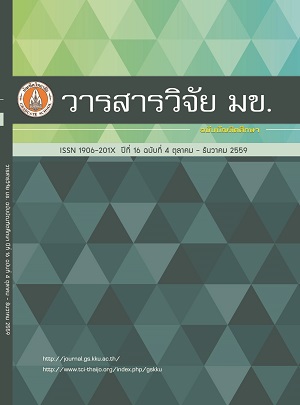Curcumin Mitigates Hypertension, Endothelial Dysfunction and Oxidative Stress in Rats Chronically Exposed to Lead (เคอร์คูมินบรรเทาภาวะความดันเลือดสูง เอนโดทีเลียมทำงานผิดปกติ และภาวะเครียดออกซิเดชันใน หนูแรทที่ได้รับตะกั่วเป็นเวลานาน)
Keywords:
Pb-induced hypertension (ตะกั่วเหนี่ยวนำภาวะความดันเลือดสูง), Curcumin (เคอร์คูมิน), Vascular dysfunction (หลอดเลือดทำงานผิดปกติ)Abstract
The aim of this study is to evaluate whether curcumin (CUR) could alleviate hypertension, endothelial dysfunction and oxidative stress in rats chronically exposed to lead (Pb). Male Sprague-Dawley rats (n=4/group) received lead acetate (100 mg/L) or deionized water as drinking water for 16 weeks. Rats were intragastrically administered with CUR (100 mg/kg/day) or propylene glycol as vehicle for the final 4 weeks of the experimental period. Results showed that Pb exposure increased arterial blood pressure, elevated peripheral vascular resistance and blunted vascular response to acetylcholine. These alterations were associated with increased superoxide production, elevated plasma malondialdehyde and decreased blood glutathione. CUR significantly improved hemodynamic status and vascular response when compared with untreated Pb controls (p<0.05). The improvements of rats exposed to Pb after CUR treatment was associated with a decrease in oxidant formation and an increase of antioxidant glutathione.
วัตถุประสงค์ของการศึกษานี้เพื่อประเมินว่าเคอร์คูมินสามารถลดภาวะความดันเลือดสูง ภาวะเซลล์เอนโดทีเลียมทำงานผิดปกติ และภาวะเครียดออกซิเดชันได้หรือไม่ในหนูแรทเพศผู้ สายพันธุ์ Sprague-Dawley หนูแรทกลุ่มละ 4ตัวได้รับสารละลายตะกั่วอะซิเตท (100 มก./ลิตร) หรือน้ำปราศจากไอออน เป็นเวลา 16 สัปดาห์ และใน 4 สัปดาห์สุดท้ายของการทดลองหนูแรทถูกป้อนด้วยเคอร์คูมิน (100 มก./กก./วัน) หรือป้อนด้วยโพรพีลีนกลัยคอลซึ่งเป็นตัวทำละลาย ผลการศึกษาพบว่าตะกั่วสามารถเพิ่มความดันเลือดแดง เพิ่มความต้านทานของหลอดเลือดส่วนปลาย และลดการตอบสนองของหลอดเลือดต่อแอซิทิลโคลีน การเปลี่ยนแปลงเหล่านี้สัมพันธ์กับการสร้างซุปเปอร์ออกไซด์ที่เพิ่มขึ้น การเพิ่มระดับมาลอนไดอัลดีไฮด์ในพลาสมา และการลดลงของกลูต้าไธโอนในเลือด เคอร์คูมินสามารถปรับพลศาสตร์ของเลือดและเพิ่มการตอบสนองของหลอดเลือดได้ดีขึ้นเมื่อเปรียบเทียบกับกลุ่มที่ได้รับตะกั่วแต่ไม่ได้รับเคอร์คูมิน (p<0.05) ผลดีที่เกิดขึ้นในหนูแรทที่ได้รับตะกั่วภายหลังจากการรักษาด้วยเคอร์คูมินพบว่าสัมพันธ์กับการลดการสร้างออกซิแดนท์และการเพิ่มสารต้านออกซิแดนท์กลูต้าไธโอน



